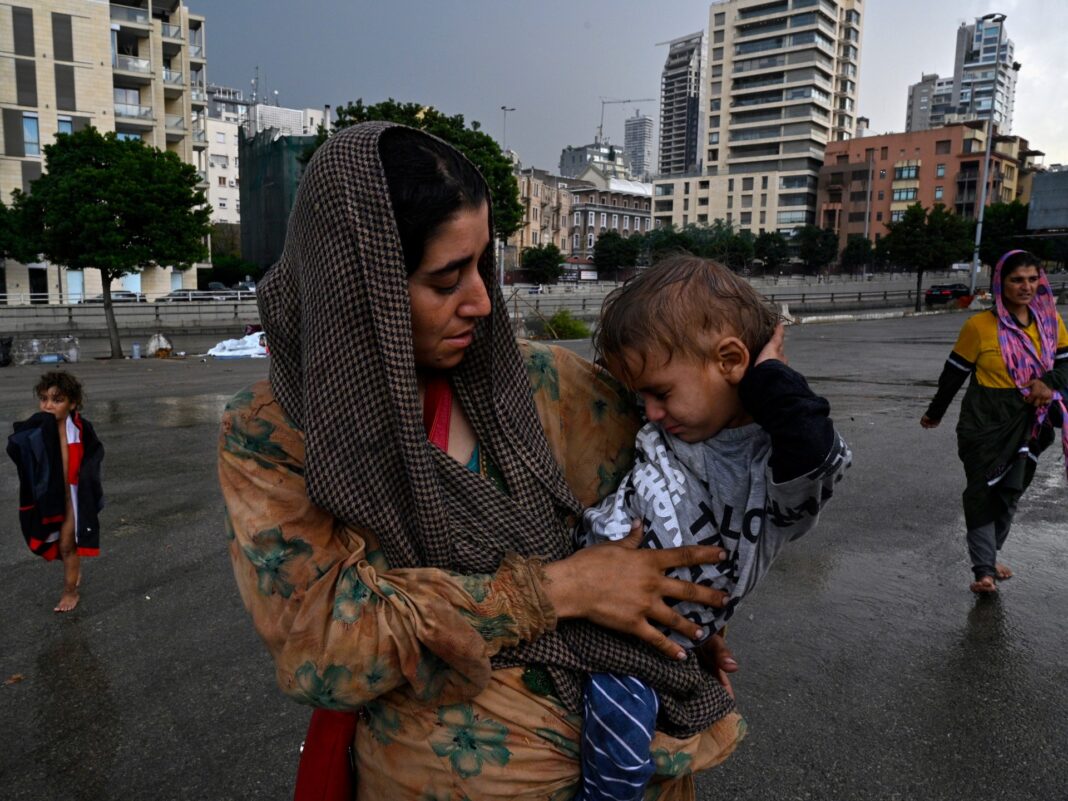Beirut, Lebanon – Fady Nasreldeen, his wife and daughter are still sleeping rough by the shores of the Mediterranean Sea, among the last holdouts after the police evicted hundreds of people from the seaside on October 31.
The people were displaced, having pitched their tents there after fleeing the Israeli bombing of their homes in the district of Dahiyeh in Beirut’s southern suburbs.
“There were about 400 to 450 people that came to the seaside,” said Nasreldeen, adding that his family had not be able to find spots in the sparse government shelters that are available in the country.
The first major exodus from Dahiyeh, which is controlled by the Lebanese group Hezbollah, was when Israeli forces dropped 80 bombs on residential buildings on September 28, killing Hezbollah’s leader, Hassan Nasrallah, and an unknown number of civilians.
Later that night, Israel issued several evacuation orders on social media, terrifying thousands of civilians into leaving their homes and seeking refuge across Beirut.
Since Israel escalated its war on Hezbollah in September, more than 1.2 million people have been uprooted from their homes. Tens of thousands have taken refuge in schools that Lebanon’s caretaker government – functioning without a president for two years – has converted into shelters.
But with space filling up, many have few alternatives but to squat in abandoned buildings or sleep in public spaces, such as outside mosques or on pavements.
Lebanese authorities are exacerbating their predicament by increasingly evicting people from informal settlements, even as winter quickly approaches and ceasefire talks waver.
Al Jazeera sent written questions to police spokesperson Joseph Salam to ask why officers are evicting displaced families from informal settlements, but no response was received by the time of publication.
Hope for a ceasefire?
Nasreldeen’s house was destroyed by the strikes that killed Nasrallah.
The blast waves blew the hinges off his doors and shattered his windows, terrifying his wife and daughter. Since fleeing, he has not returned to Dahiyeh but says he will rebuild his apartment once the war stops.
Last week, he was optimistic that a ceasefire might arrive before the United States elections on November 5, but news reports of a possible truce quickly lost their lustre.
“A few days ago, we didn’t think the war would drag on, but now we think that the war could go on for at least another few months,” he told Al Jazeera.
Michael Young, an expert on Lebanon with the Carnegie Middle East Center, said he is sceptical about reports of a possible ceasefire.
After assessing the terms of a purported ceasefire proposal leaked to the Israeli media, Young believes Israel and the US were in effect calling on Hezbollah to surrender by conditioning a truce on giving Israel the right to strike southern Lebanon whenever it wanted.
“I mean, in every way [the ceasefire terms] was a surrender to the Israeli conditions,” Young said.
“The only explanation I have … is that these [terms] did not result in any kind of negotiation, but it was a conscious leak to show that the Americans are supporting Israel all the way,” he told Al Jazeera.
Left in the cold
With no truce in sight, many displaced families are bracing for a winter out in the cold.
Nasreldeen said he may set up a small tent to continue sleeping by the seaside.
Lebanon often experiences heavy rain in the winter and freezing temperatures, so a tent may not be warm enough for him and his family, but Nasreldeen insists on trying.
“If the police don’t come and kick us out again, then we may make a little encampment here to shelter ourselves in the winter. … What else are we supposed to do?”
Other displaced families are squatting in buildings that have been abandoned or vacant for years, even decades. They try to fix up the buildings by cleaning the rooms and furnishing them with whatever they can find.

Lebanese authorities have evicted people from some of these buildings – sometimes at the landowner’s request – without providing alternative shelter.
Young believes the caretaker government, which is reeling from an acute economic meltdown and is unprepared to address the crisis, will eventually need to scale back evictions.
“At some point, the government will have to stop these evictions whether it likes it or not. Winter is coming, and it cannot just throw people on the cold streets,” he told Al Jazeera.
But he has little hope that the government can come up with any durable solutions.
“On all levels, the Israelis have created a massive social problem for which the Lebanese government is completely unprepared,” he said.
Al Jazeera sent written questions to Albert Chamoun, a spokesperson for the Ministry of Education and Higher Education, which is playing an important role in relief operations, but no response was received by the time of publication.
Civil initiatives
The lack of assistance from the Lebanese government and political factions has pushed local relief groups to spearhead the aid response.
One organisation, Farah al-Ataa, which means “the joy of giving”, has opened what it describes as a guest house in Qarantina, a low-income neighbourhood in northeast Beirut.
It is sheltering about 600 people and will soon expand to take in 1,000.
“We requested this space from the municipality as an organisation, and they gave it to us. But to be honest, the authorities don’t help us otherwise,” said Cynthia Mahdi, 25, a volunteer originally from southern Lebanon.

Many Farah al-Ataa volunteers have themselves been uprooted by Israel’s bombardments. Despite their ordeals, they have joined forces to cook hot meals and provide shelter for the least privileged in their community.
Safah, a 40-year-old woman who identified herself by her first name only, is among those being supported. She arrived at the guest house two weeks ago after her family was evicted from an abandoned building where they had sheltered after fleeing their home in Dahiyeh in late September.
While Safah said conditions in the guest house are relatively good, she yearns to return home.
“We still have hope,” she told Al Jazeera from her modest bedroom in the guest house.
“Our hope is with God.”


